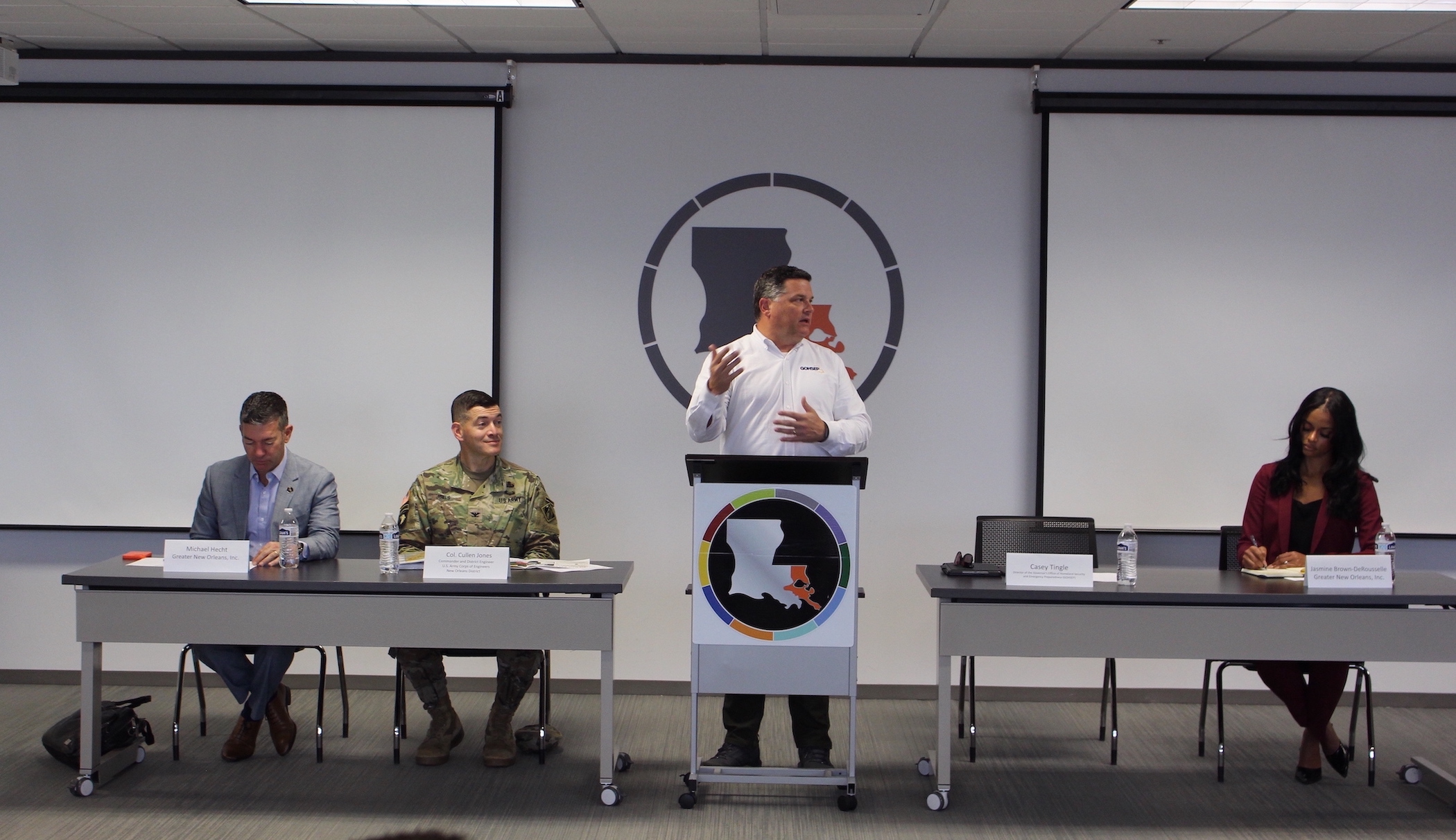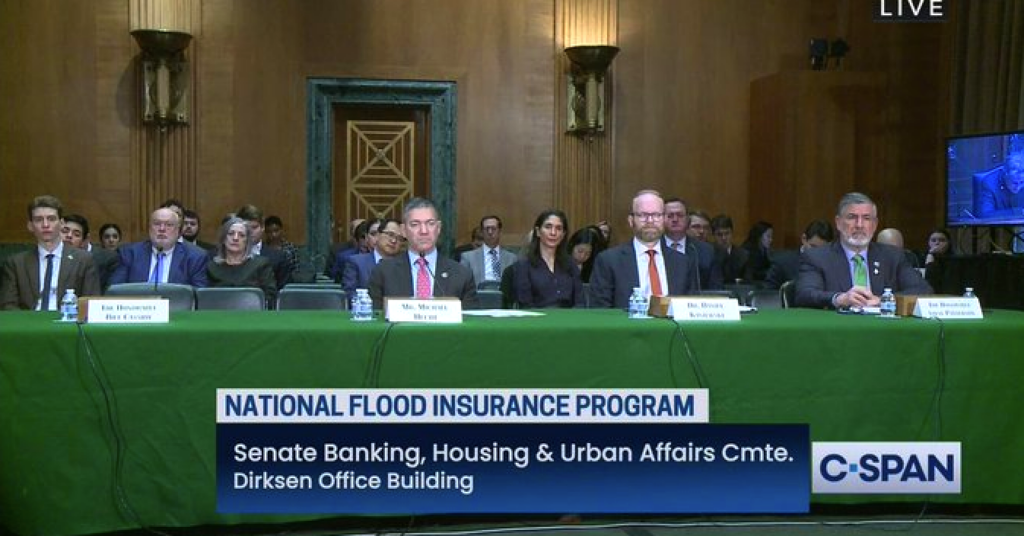Public Policy

Policy Priorities for a Stronger Region
GNO, Inc. works to establish and preserve policies that create a more favorable, competitive, and reliable business climate in Greater New Orleans and drive long-term job growth and wealth creation for its citizens.
Healthy economic growth for our region is GNO, Inc.’s top priority. Notable recent policy achievements include the following pieces of legislation signed into law by Gov. John Bel Edwards:
- Economic Recovery & Development – Provide businesses support as they grow in the region
- Tax Structure – Simplify the tax code and eliminate Louisiana’s personal and corporate income taxes
- Infrastructure – Find creative solutions to fix our roads and support modern transportation
- Workforce – Strengthen workforce and address employment shortages
- Early Childhood – Support early childhood education
- State Retirement – Modernize state retirement plans
- Legal Climate – Build upon efforts to improve Louisiana’s legal climate
- Criminal Justice – Identify community-driven and fiscally responsible reform targets within the criminal justice system
- Coastal Restoration – Support and champion Louisiana’s coastal restoration efforts
2023 Legislative Session Recap
The 2025 Legislative Session saw a swell of activity and substantial policy strides. Legislators seized the opportunity of the 8-week session to address pressing priorities including, but not limited to, insurance, infrastructure, incentives, and energy reforms. GNO, Inc. rose to the occasion, advancing priorities to uplift economic development conditions for the region and state. To that end, GNO, Inc. was directly involved in developing and delivering the following accomplishments:
- Organized advocacy efforts securing favorable statutory conditions for the St. Bernard Transportation Corridor, an essential component of the Louisiana International Terminal:
- Coordinated letters of support to all Representatives and Senate Transportation Committee
- Secured LED Secretary Bourgeois’ committee testimony
- Testified three times, supplementing WTCNO’s two appearances
- Partnered with energy stakeholders to defeat nearly 20 anti-CCS bills, testifying successfully against local authority over permitting approval
- Drafted amendment language establishing LED approval authority for state and local sales tax exemptions tied to PILOTs
- Advanced the High Impact Jobs Program, partnering with LED in research and through the adoption of regional wages for distressed area tiering
- Initiated and organized the Public Projects Task Force to recommend bid law reforms securing a post–Super Bowl LIX win for public bid reform
- Supported tort reform by testifying for a modified comparative fault system (Act 15) and publishing an editorial in coalition with local business councils (LTE)
- Met with Senate President to secure $2M appropriation for Regional Economic Alliance of Louisiana
- Contributed to DOTD organizational reform:
- Authored amendment requiring integration of state highways with transit, rail, and local roads to improve workforce access and connectivity to higher education
- Secured amendment for improved letting totals and contracting dependability
- Facilitated $4M increase to SWBNO Power Complex by connecting SWBNO leadership with the Louisiana Chief Resilience Officer
- Opposed narrowing of energy development scope, resulting in amendment to include LED in grid planning and renewable demand analyses
- Joined partners in opposition to defeat restrictive solar siting proposals, preserving Louisiana’s all-of-the-above energy strategy
- Submitted letter of opposition for GUMBO 1.0/2.0’s unreliable broadband funding schedule, leading to failed committee passage
- Supported Angel Investor Tax Credit which, along with successful lobbying of the gubernatorial administration, contributing to successful bill passage
- Secured passage of Apprenticeship Tax Credit through coalition support
- Coordinated business support for annual ROI review of high school industry-based credentials by the Workforce Investment Council
- Provided business support for the creation of the Career Alignment Task Force, cited by Commissioner Kim Hunter Reed
State legislative progress was impacted by legislation supported or monitored by GNO, Inc.:
ECONOMIC DEVELOPMENT
Louisiana advanced its economic development strategy through a suite of modernized incentive programs and organizational reforms. LED’s organizational structure was refined, the LED Innovation Fund was established (Act 432), and a $150M investment into the Site Development Fund was secured (Act 365). A new High Impact Jobs Grant Program (Act 372) was created to provide reimbursable grants for high-wage jobs that contribute to economic growth. Early-stage investment will be bolstered by the extension and enhancement of the Angel Investor Tax Credit (Act 515). The state’s motion picture tax credit was bolstered to strengthen its competitiveness and retain productions (Act 44).
TAXES
The state aligned S-Corp tax treatment with federal law (Act 382) and improved remote sales tax collection (Act 433). If voters approve a 2026 constitutional amendment, parishes may exempt business inventory from property tax with state backfill support (Act 357 / Act 221). Additional reforms (Act 498) will strengthen refund processing and enforcement at the Department of Revenue.
INTERNATIONAL TRADE
The legislature advanced the authorization of the St. Bernard Transportation Corridor (Act 217), a vital component of the Louisiana International Terminal. The corridor will be developed as a public-private partnership, connecting the terminal directly to the interstate system to reduce local traffic. It will also serve as a critical hurricane evacuation route for St. Bernard Parish residents.
INSURANCE
Major insurance and tort reform measures advanced which include, but are not limited to, limiting damage recovery for claimants over 51% at fault through a modified comparative fault system (Act 15), overruling the Housley presumption (Act 18), increasing the “No Pay, No Play” threshold (Act 16) and medical billing transparency (Act 466). Further sustainable investments were made to bolster the Fortified Roof Program by redirecting $5M annually to the Louisiana Fortify Homes Fund (Act 79).
ENERGY
House and Senate leaders considered an array of measures related to energy. The state modernized DENR – now the Dept. of Conservation and Energy (DCE) – yet introduced a 26-month legacy lawsuit timeline and the prohibition of eminent domain for non-common carrier CCS pipelines (Act 458). Solar siting requirements were adopted (Act 279), and the state requires agencies to analyze if renewable energy is sufficient for economic development projects (Act 462). The state authorized the initiation of permitting parity for advanced nuclear energy (Act 111). Nearly 20 measures introduced to limit carbon capture were successfully opposed (including, but not limited to HB 4, HB 601).
INFRASTRUCTURE
DOTD reorganization remained a priority for the Governor and legislators throughout session. The Office of Transformation and Office of Project Delivery were established (Act 375), and a requirement to deliver 90% of project progress in the Highway Priority Program was mandated (Act 380). The state established the Office of LA Highway Construction under the Div. of Administration (Act 389). The Public Projects Task Force was created to modernize public bid law (SCR 69). Composition and procedures of the nominating committee for SLFPA-E and SLFPA-W were updated (Act 395). Unfavorable broadband oversight and funding disbursement was successfully opposed (HB 689).
WORKFORCE
Workforce and talent highlights include aligning TOPS-Tech and Early Start with M.J. Foster “qualified program” rules (Act 152), establishment of a $2,500 youth apprenticeship tax credit entitled the Work-Based Learning Tax Credit (Act 376), and expansion of the School Readiness Tax Credit (Act 454). The Louisiana Workforce Commission was restructured and renamed “Louisiana Works” to create a “one-door” model to unify workforce and public assistance programs (Act 478).
EDUCATION
Key education wins this session included a uniform 10-point grading scale for TOPS (Act 356) and a new “Excellence” tier for high ACT scores (Act 347). The Workforce Investment Council must now report ROI on high school credentials (Act 187), and capital improvements were funded for LCTCS, including NTCC Hammond (Act 35). UNO’s transfer to the LSU System (Act 447) includes regional workforce alignment provisions.
COASTAL RESTORATION & PROTECTION
The CPRA FY26 Annual Plan, a record-breaking $1.98B investment supporting over 13,000 jobs, passed (HR 36, SR 28). The state created the CURRENT Authority for upland flood management, and established an approval structure for state flood mitigation planning and statewide NFIP strategy coordination (Act 418).
LOCAL AND MUNICIPAL
The state requested DOTD study the Geaux Pass toll functions and improvements to the program for future projects, such as the Peters Road bridge (HR 220). Requirements to select the commissioner of the Ernest Morial New Orleans Exhibition Hall Authority were modernized (Act 301). The state authorized the ability of the French Quarter Management District to procure an emergency sanitation contract (Act 252), and the New Orleans Fair Grounds was designated as a historic site (Act 445).
Coalition for Sustainable Flood Insurance
GNO, Inc. believes stability, availability and affordability of flood insurance is a critical component of a thriving business environment. To that end, GNO, Inc. established the Coalition for Sustainable Flood Insurance (CSFI) in 2013, in response to implementation of the Biggert-Waters Act, which created unaffordable and unsustainable National Flood Insurance Program (NFIP) premiums across the country.
CSFI advocated for passage of the Homeowner Flood Insurance Affordability Act in 2014, with support of both causes (cosponsored by 235 House Members, supported by 306 Members and 72 Senators).
Since inception, CSFI has worked with more than 250 organizations, across 35 states, including homebuilders, chambers of commerce, lawmakers, and consumer advocates. CSFI continues to advocate for efficient implementation of and successful long-term reauthorization of NFIP and believes the following principles are critical to sustainable flood insurance:
- Risk Assessment – Enhancing the way we assess and communicate risk will protect communities and the NFIP over the long-term and help to close America’s flood insurance gap. Congress and FEMA should use state of the art technology to accurately and simply communicate flood risk
- Affordability – Premiums must remain affordable, and people who played by the rules at the time they built or bought their flood policy should not be penalized.
- Mitigation – A comprehensive approach to reducing flood losses before a disaster occurs is a more effective means to reducing economic loss and protecting taxpayers’ interests. Federal, state, and local governments should prioritize investments in mitigation, as should home and business owners
- Participation – Adopting policies that encourage more people to carry flood insurance will ensure a greater understanding of flood risk and that individuals and communities recover more quickly and fully following a flood event
Head to the CSFI website for more information and to sign up for updates.
Federal Policy Priorities
GNO, Inc. works at the federal level to support and advance the following advocacy efforts:
- National efforts to reauthorize and reform the National Flood Insurance Program
- Pro-growth tax policies that alleviate burdens on small businesses and simplify tax administration and collections
- Continued funding of the U.S. Economic Development Administration, which invests in local job creation
- Pro-trade policies that support Louisiana’s robust export economy
- Federal investments in Louisiana’s infrastructure, from our extensive port system and national energy infrastructure, to roadways, bridges, and high-speed rail
- Policies that protect Southeast Louisiana’s military installations
- Federal investments in Louisiana’s advanced manufacturing facilities
- Policies that make Louisiana more resilient, including funding for coastal restoration


